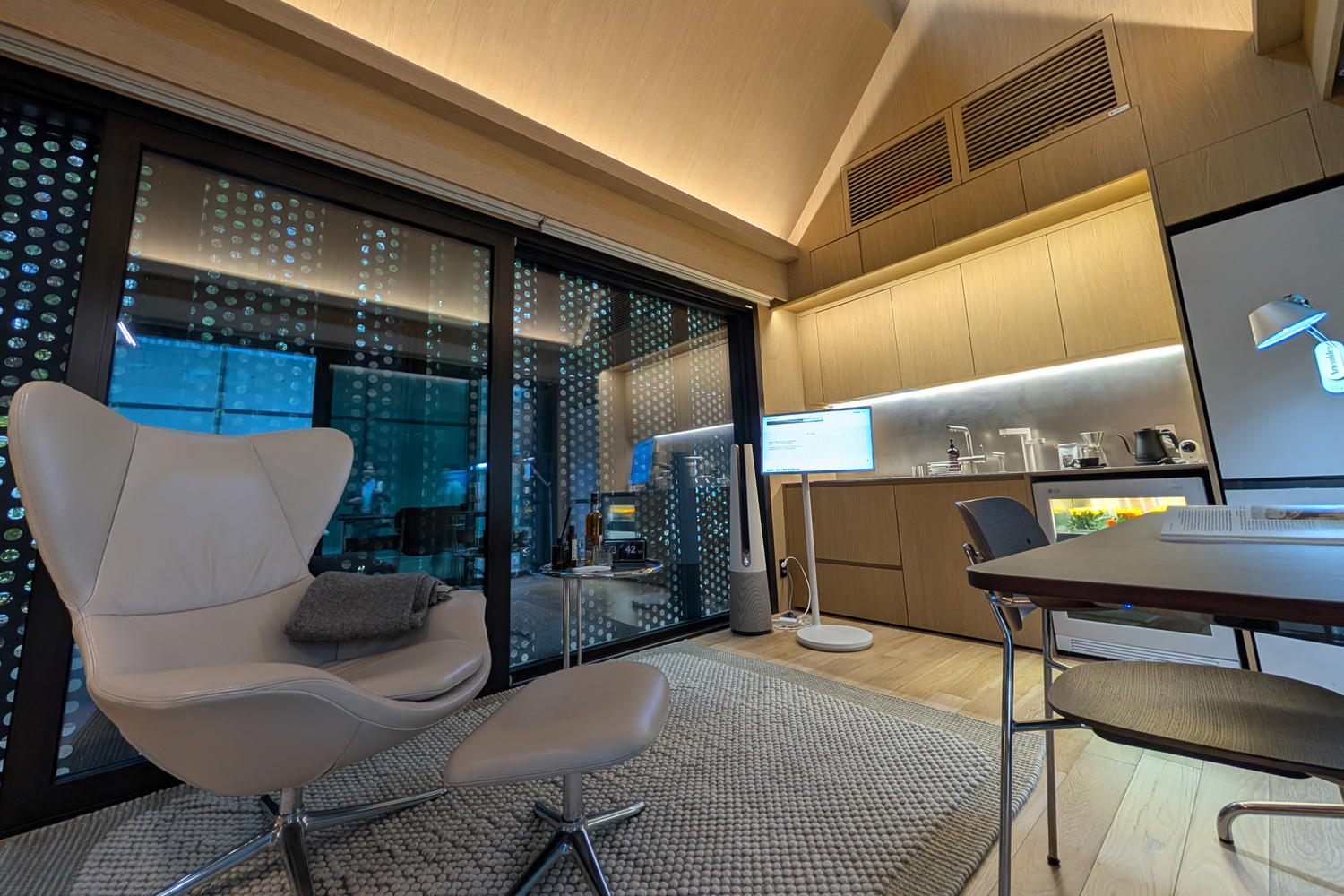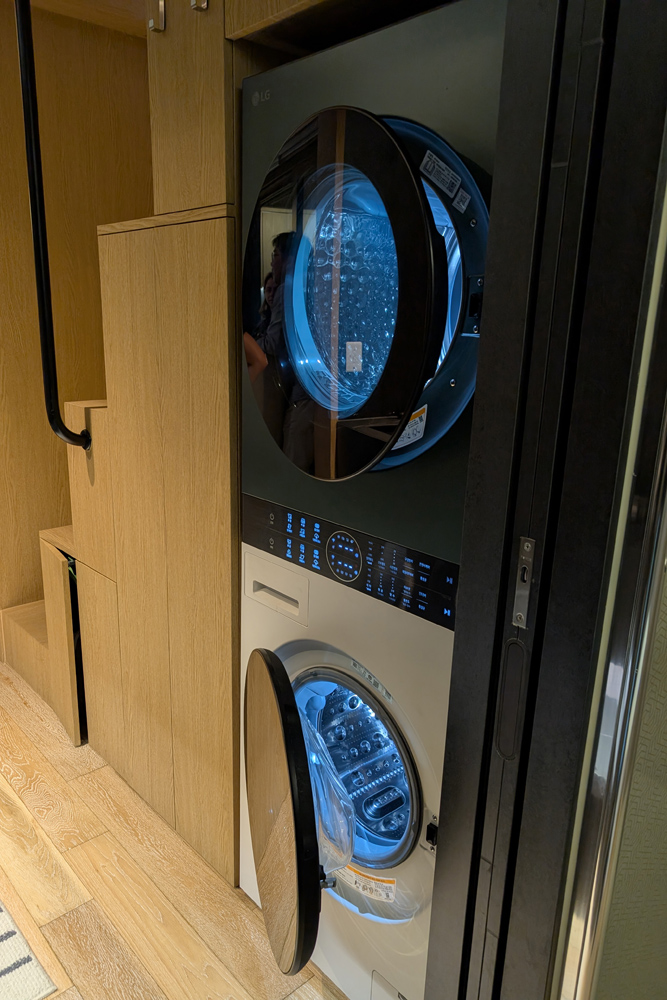[ad_1]
“Home is where the smart is”, as the old saying goes. Or at least I think it does. Someone at LG was on the same wavelength, as the Korean tech conglomerate has just started selling prefabricated small houses that come fully furnished with tech, right off the lorry. That might sound like an unusual side hustle for a firm best known for fridge freezers and 4K TVs, but after a tour of the show home on display outside LG’s Seoul headquarters, I’m fully on board.
The new venture, which got the green light in 2022 and will have just started taking customer orders by the time you read this, was envisioned as a way of providing small second homes to city dwellers. Almost half of South Korea’s population lives in the Seoul Metropolitan Area, yet it covers less than 12% of the country; plonk an LG Smart Cottage down somewhere in the countryside and suddenly you’ve got a way to escape the rat race on the weekend that doesn’t involve tents and sleeping bags.
They might not be intended for full-time living, but each Smart Cottage has everything you’d need to downscale permanently. Hookups for mains power, water and sewage; solar panels on the roof; separate sleeping, living and bathroom areas, plus secure outdoor storage; and of course a comprehensive 14 different LG appliances on the kit list.
Highlights include the unique, space-saving WashTower 2-in-1 washing machine/tumble dryer and the StanbyME pole-mounted 4K TV that can be wheeled anywhere in the Cottage. There’s also a single door fridge freezer, induction cooktop, Light Wave electric oven, dishwasher and water purifier for the kitchen area; a CordZero A9 cordless vacuum cleaner for keeping the place spotless between visits; a Home Brew beer making machine and 49-capacity wine fridge; and the oddball tiiun plant incubator. There’s no mix-and-match going on here, so you can’t swap out the water purifier for an LG Gram laptop or G4 OLED telly.
There are two layouts on offer: the single-floor, 26.6m2 Mono and the two-floor, 44.4m2 Duo. Plus variants of each come with those aforementioned solar cells, 15kW energy storage batteries for several days of off-grid power (which could be sold back to your supplier during the week when you’re not in residence), and a higher grade of bundled appliances. You even get a choice of exterior colours. The show home was the larger of the two, and was filled with the sort of modern, minimalist soft furnishings LG’s team expects customers to favour.

I was impressed by how permanent the whole thing felt, given it was craned off the back of a lorry and installed in just two days. Giant folding privacy screens on either side unfurl to reveal floor-to-ceiling windows that flood the living area with light, while smaller panes that line a raised portion of the roof help brighten up the sleeping area. It’s accessed by some funky looking – but slightly precarious – offset stairs, and has just enough room in the middle to stand up straight. It’s definitely more futon than four poster bed up there, with sharply angled ceilings.
The shower and toilet are enclosed, with the galley-style sink area spilling out into the corridor, but there was ample room; couples won’t find themselves stumbling over each other here, though they’ll want to pack fairly light. Hidden cubbies under the stairs and kitchen cupboards aside, there’s not a colossal amount of room for storage.
That’s partly because an outdoor entrance area accounts for a fair amount of the Cottage’s footprint. There’s easily room to store a bicycle here, or it could double as a veranda during the warmer months. A cupboard hides the energy storage battery, with the majority of the electrical work tucked away in a separate area at the rear of the building.

An electronics manufacturer branching out into tiny homes makes a lot of sense, when you think about it. “LG already had home appliances, air conditioning, battery storage, and smart home devices,” Bruno Lee, head of the Smart Cottage Company, told me. “The only thing we were missing was the home!”
The Smart Cottage is already as connected as it gets, but could get smarter still once LG’s ThinQ ON home hub arrives. The work-in-progress way to control all your connected tech with natural language is still in development, but is due to launch in Korea by 2025. Instead of keyboards like “set the LG air conditioner to 18 degrees”, the AI-powered hub will understand simpler phrases like “it’s really hot” and adjust accordingly. Thread, Zigbee and Wi-Fi support mean it’ll work with third-party gadgets, too.
LG doesn’t handle everything when it comes to installation, but is ready to put Korean buyers in touch with local contractors that can handle things like laying a foundation, craning the house into place, and hooking up to the grid. You’ve also got to own the land, and deal with all the bureaucracy that comes with house building. With all that in place, you can go from order to build to delivery in just two months. The firm is focused on home soil sales right now, though it sees potential in a US expansion later down the line.
No prefab home comes cheap, and one as laden with tech as the LG Smart Cottage can demand more of a premium. The entry-level Mono model starts at 200,000,000 Korean Won (roughly £111,000), and climbs to 390,000,000 Won for the Duo+ (about £217,000). Want solar panels on your Mono? That’ll be another £14,000, give or take.
Seeing how you could spend more than that on the sort of static caravan that peppers the English coastline – and not get any LG appliances thrown in to the bargain – I’d argue it’s pretty good value. Now wants to give this writer a mortgage – and help get a shipping container-sized smart home from Seoul to Southampton?
[ad_2]
Source link

